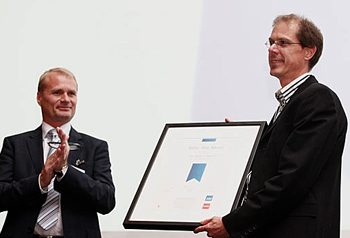Professor Arjen Hoekstra receives Baltic Sea Award for research on water footprint
Professor Arjen Hoekstra of the University of Twente has received the Baltic Sea Award. He was awarded for his research on the Water Footprint. This is an indicator of water use that looks at both direct and indirect water use of a consumer or producer.
The ceremony took place in Gdansk (Poland), during the annual summit of the Baltic Development Forum and the second annual forum on the EU Strategy for the Baltic Sea region by the European Commission.
It is the first time that this award is presented to anyone outside the Baltic Sea region. Earlier prize winners include the President of Finland. To award a sum of 5000 euros linked. The Baltic Sea Award is awarded alternately to politicians, businessmen and scientists. Of the jury include the Prime Minister of Poland Donald Tusk.
Extraordinary tool for the region
The Water Footprint can give an indication of the water consumed in e.g. agriculture, industry and households. Although the water footprint is not specific to the Baltic Sea region, the concept is seen as an extraordinary and very interesting for the area.
Professor Hoekstra developed the Water Footprint in 2002. In February the Global Water Footprint Standard was published of which Hoekstra was the chief author. The Global Water Footprint Standard ensures that the Water Footprint is measured in a common language and understanding. This standard has been endorsed worldwide and is used by various governments and organizations.
World wide network
Professor Hoekstra addition to his role as professor at the University of Twente also scientific director of the Water Footprint Network, an organization created by the enormous worldwide interest in the Water Footprint. The Water Footprint Network has about 180 partners, including governments, international institutions and the World Wildlife Fund.
Improvement of the water quality
The Baltic Sea Region covers Northern Europe, including Iceland, northern Germany and part of Russia. The region is a stronger profile in the world, especially in terms of sustainability.
The Baltic Sea is one of the most polluted waters in the world. This is mainly due to excessive use of nutrients in agriculture and inadequate treatment of waste water in households and industry. The rivers carry the pollution to the sea. The Baltic Sea Region will use the Water Footprint to improve this situation.
More information
Water Footprint Network
c/o University of Twente
Enschede, The Netherlands
www.waterfootprint.org




